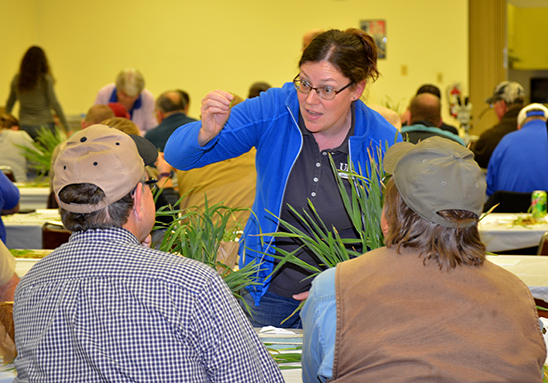UK training helps farmers learn how to assess wheat freeze damage
UK training helps farmers learn how to assess wheat freeze damage

Slowly and methodically, farmers cut into a wheat plant under the guidance of University of Kentucky College of Agriculture, Food and Environment specialists. To the farmers, this exercise to reveal tillers still inside the stem was more than a scientific procedure. It gave them tools to help them assess potential freeze damage to their crop and make a decision on what to do next.
The plant dissection was just one of the topics covered during the Emergency Wheat Freeze Damage Training coordinated by Edwin Ritchey, UK soil extension specialist, and other members of UK’s Wheat Science Group in response to frigid temperatures March 14-16. It is the first significant freeze Kentucky wheat growers have faced in some time. Similar freeze events occurred in 2012 and 2007.
“We wanted to have this meeting before a lot of damage was showing in the field, so farmers know how to determine whether they have a lot of injury,” Ritchey said. “We also gave them information that should give them a pretty good idea of how to proceed once they are able to assess their level of damage and have a well-informed conversation with their insurance adjuster.”
Typically a freeze this early in the season would not have caused alarm. However, due to the mild winter, much of the area’s wheat was in an advanced growth stage and more susceptible to freeze damage. Farmers from five states packed a meeting room at the UK Research and Education Center, and many others tuned in online, to hear UK specialists cover several aspects of freeze damage, potential situations and options as a result of the weather event.
One of the farmers in attendance was Don Halcomb, who grows wheat, barley and rye in Logan County.
“We had different planting dates so our growth stages were all over the place, but we had a lot at Feekes 6, which is where you would expect some damage,” he said.
Carrie Knott, UK grain crops extension specialist, led farmers through the plant dissection and covered many agronomic aspects of freeze damage. Knott, as well as UK specialists in plant pathology, entomology, economics, soil science, weed science and forages, fielded questions from participants in the room and online.
“We were seeing a lot fewer damaged heads today than I anticipated. On Saturday and Sunday, I was already starting to see damaged wheat heads everywhere I checked in my wheat research plots at the station,” Knott said. “The problem now is the stem damage. In the next week or so, we could still have some stem splitting that could cause those wheat plants to decline and possibly lose yield.”
Visible signs of freeze damage do not immediately appear in fields as wheat needs at least five to seven days of temperatures above 40 degrees before damage appears. That may come to many areas of the state before the end of the week.
“Farmers can take this information and apply it in the field in the next two to three days to start making decisions on their wheat fields,” said John Grove, director of the UK Research and Education Center. “We hope to have more trainings like this now and in the future, and one of the ways we’re hoping to do that is with the UK Grain and Forage Center of Excellence. That includes remodeling this facility to make it even better equipped for these types of trainings and better serve the needs of our clientele across the state and region.”
In the training, UK specialists reminded farmers that it is still a waiting game, as it is early in the season, and their yield potential may ride on the weather during the rest of the growing season.
“Nobody really knows how much damage we are going to have,” Halcomb said. “In 2007, we had a similar situation, but we had some really good weather from that point forward, and we had a lot better yields than anybody expected. It’s a waiting game, but that’s farming.”
Agricultural Economics Entomology Events Extension Research Weather


